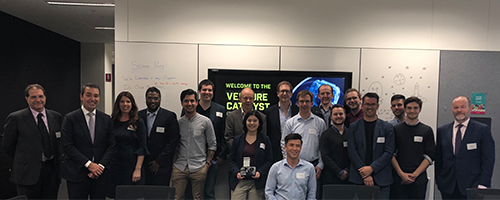12 September 2018
 Today the University of South Australia has announced the five companies that have been chosen to be part of the State’s first space incubator program, Venture Catalyst Space.
Today the University of South Australia has announced the five companies that have been chosen to be part of the State’s first space incubator program, Venture Catalyst Space.
The program is part of the State Governments $4m Space Innovation Fund which was launched in September last year and will be delivered by UniSA’s Innovation & Collaboration Centre (ICC), along with its global partners the South Australian Space Industry Centre and the International Space University.
The following five companies will work closely with the ICC’s Entrepreneur in Residence, Kirk Drage and a network of expert advisers, over six months to test their ideas and develop their businesses.
Ping Services (South Australia)
Ping Services use a ‘ping monitor’ to detect damaged blades on wind turbines using sound waves. The device relies on satellite communication as wind farms are generally located in areas with limited mobile phone reception. Currently turbine monitoring is performed periodically using photography, manual inspection or drone inspection as infrequently as every 18 months.
ResearchSat (South Australia)
ResearchSat is working on medical research in space. The team has developed small satellites which can take microbiological experiments to space in a confined and controlled environment to monitor their behaviour and catalogue any changes to eventually develop new pharmaceutical drugs to treat disease. The satellites have been developed to be viable, accessible and affordable for all researchers.
Wright Technologies (South Australia)
Winners of the global ActInSpace competition, Wright Technologies envision a future where drones are flying all around us. The team is focused on the importance of a universal standard to guarantee fool-proof identification and tamper-proof tracking of drones. Their solution, ‘Seraph’, is a unique system for drone registration and real-time tracking to improve safety, security and most of all reduce barriers to innovation by developing a drone ecosystem.
Safety from Space (South Australia)
Safety from Space is working on a safety system for those in remote locations too far from wireless coverage. With satellite phones being prohibitively expensive, the team proposes an alternative and supplementary service (and the support infrastructure) to provide specific messaging via satellite for dangerous situations that could easily and rapidly develop into an emergency.
Tekuma (New South Wales)
Tekuma has developed the next generation of intuitive hand controller hardware or ‘joysticks’ which uses patented technology and custom firmware to process a user’s tactile hand movements. This enables them to control an object, such as a drone, with one hand. The solution is sturdier and more secure than current solutions in the market and is universal, allowing it to speak to all drones or other hand-controlled objects such as remote robots or jet packs.
These successful companies will receive a series of capability workshops, one-on-one mentoring, workspace and a stipend of $6,000 as well as the opportunity to pitch for a fully-funded overseas tour to the United States or Europe to network with relevant space industry primes, investors and other startups.
The Innovation & Collaboration Centre will run Venture Catalyst Space over the next four years with the support of the State Government.
An open stream of the Venture Catalyst incubator program will be taking applications in November 2018 for the program beginning in March 2019 via icc.unisa.edu.au.
Media contact: Georgia Minarelli email: Georgia.Minarelli@unisa.edu.au mobile: 0413 314 726


